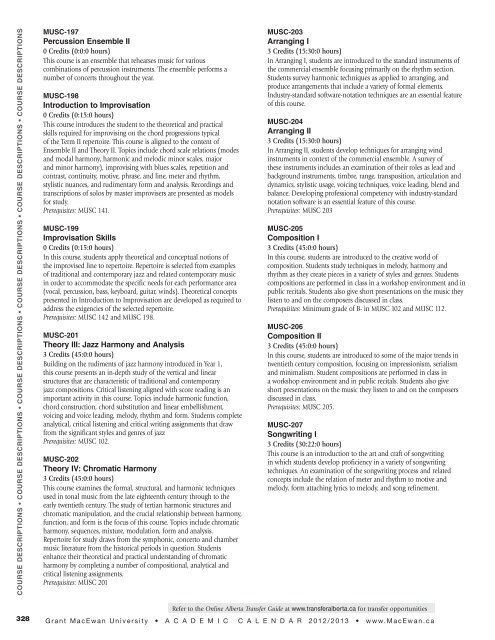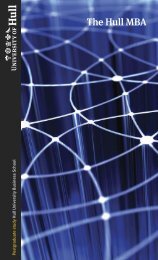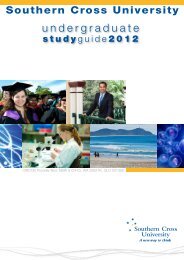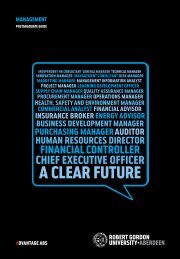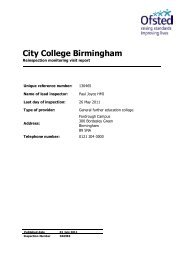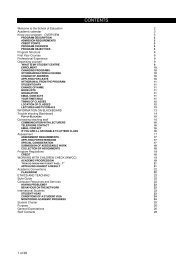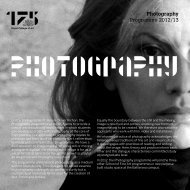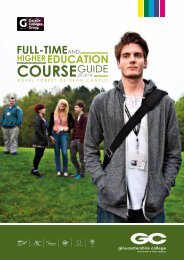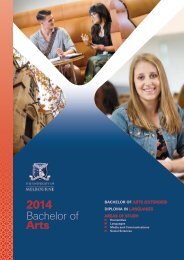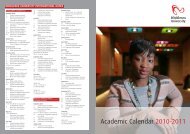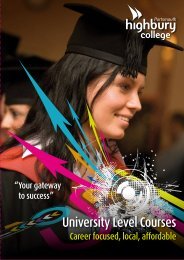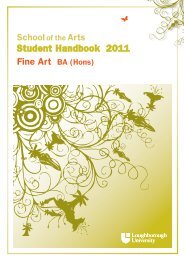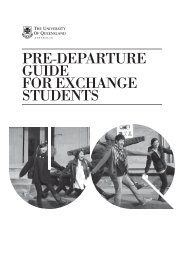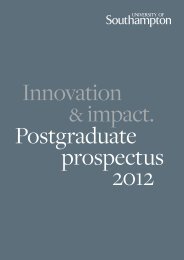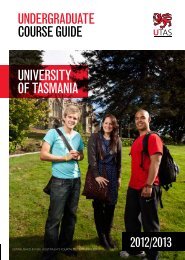Academic Calendar 2012/2013
Academic Calendar 2012/2013
Academic Calendar 2012/2013
Create successful ePaper yourself
Turn your PDF publications into a flip-book with our unique Google optimized e-Paper software.
course Descriptions • course Descriptions • course Descriptions • course Descriptions • course Descriptions • course DescriptionsMUSC-197Percussion Ensemble II0 Credits (0:0:0 hours)This course is an ensemble that rehearses music for variouscombinations of percussion instruments. The ensemble performs anumber of concerts throughout the year.MUSC-198Introduction to Improvisation0 Credits (0:15:0 hours)This course introduces the student to the theoretical and practicalskills required for improvising on the chord progressions typicalof the Term II repertoire. This course is aligned to the content ofEnsemble II and Theory II. Topics include chord scale relations (modesand modal harmony, harmonic and melodic minor scales, majorand minor harmony), improvising with blues scales, repetition andcontrast, continuity, motive, phrase, and line, meter and rhythm,stylistic nuances, and rudimentary form and analysis. Recordings andtranscriptions of solos by master improvisers are presented as modelsfor study.Prerequisites: MUSC 141.MUSC-199Improvisation Skills0 Credits (0:15:0 hours)In this course, students apply theoretical and conceptual notions ofthe improvised line to repertoire. Repertoire is selected from examplesof traditional and contemporary jazz and related contemporary musicin order to accommodate the specific needs for each performance area(vocal, percussion, bass, keyboard, guitar, winds). Theoretical conceptspresented in Introduction to Improvisation are developed as required toaddress the exigencies of the selected repertoire.Prerequisites: MUSC 142 and MUSC 198.MUSC-201Theory III: Jazz Harmony and Analysis3 Credits (45:0:0 hours)Building on the rudiments of jazz harmony introduced in Year 1,this course presents an in-depth study of the vertical and linearstructures that are characteristic of traditional and contemporaryjazz compositions. Critical listening aligned with score reading is animportant activity in this course. Topics include harmonic function,chord construction, chord substitution and linear embellishment,voicing and voice leading, melody, rhythm and form. Students completeanalytical, critical listening and critical writing assignments that drawfrom the significant styles and genres of jazzPrerequisites: MUSC 102.MUSC-202Theory IV: Chromatic Harmony3 Credits (45:0:0 hours)This course examines the formal, structural, and harmonic techniquesused in tonal music from the late eighteenth century through to theearly twentieth century. The study of tertian harmonic structures andchromatic manipulation, and the crucial relationship between harmony,function, and form is the focus of this course. Topics include chromaticharmony, sequences, mixture, modulation, form and analysis.Repertoire for study draws from the symphonic, concerto and chambermusic literature from the historical periods in question. Studentsenhance their theoretical and practical understanding of chromaticharmony by completing a number of compositional, analytical andcritical listening assignments.Prerequisites: MUSC 201MUSC-203Arranging I3 Credits (15:30:0 hours)In Arranging I, students are introduced to the standard instruments ofthe commercial ensemble focusing primarily on the rhythm section.Students survey harmonic techniques as applied to arranging, andproduce arrangements that include a variety of formal elements.Industry-standard software-notation techniques are an essential featureof this course.MUSC-204Arranging II3 Credits (15:30:0 hours)In Arranging II, students develop techniques for arranging windinstruments in context of the commercial ensemble. A survey ofthese instruments includes an examination of their roles as lead andbackground instruments, timbre, range, transposition, articulation anddynamics, stylistic usage, voicing techniques, voice leading, blend andbalance. Developing professional competency with industry-standardnotation software is an essential feature of this course.Prerequisites: MUSC 203MUSC-205Composition I3 Credits (45:0:0 hours)In this course, students are introduced to the creative world ofcomposition. Students study techniques in melody, harmony andrhythm as they create pieces in a variety of styles and genres. Studentscompositions are performed in class in a workshop environment and inpublic recitals. Students also give short presentations on the music theylisten to and on the composers discussed in class.Prerequisites: Minimum grade of B- in MUSC 102 and MUSC 112.MUSC-206Composition II3 Credits (45:0:0 hours)In this course, students are introduced to some of the major trends intwentieth century composition, focusing on impressionism, serialismand minimalism. Student compositions are performed in class ina workshop environment and in public recitals. Students also giveshort presentations on the music they listen to and on the composersdiscussed in class.Prerequisites: MUSC 205.MUSC-207Songwriting I3 Credits (30:22:0 hours)This course is an introduction to the art and craft of songwritingin which students develop proficiency in a variety of songwritingtechniques. An examination of the songwriting process and relatedconcepts include the relation of meter and rhythm to motive andmelody, form attaching lyrics to melody, and song refinement.328Grant MacEwan University • A C A D E m I CRefer to the Online Alberta Transfer Guide at www.transferalberta.ca for transfer opportunitiesC A L E N D A R <strong>2012</strong>/<strong>2013</strong> • www.MacEwan.ca


